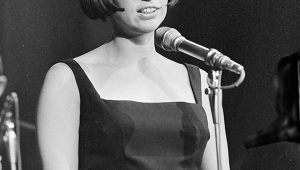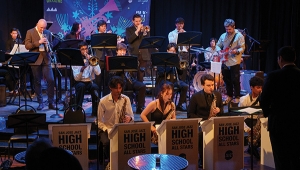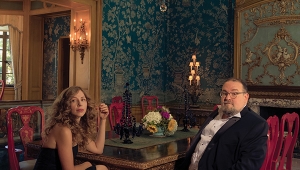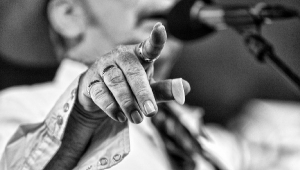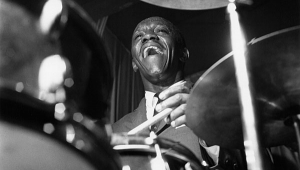| Columns Retired Columns & Blogs |
Tannhäuser: Wagner's "problem" opera Page 2
Mixing the Paris and Dresden versions, the Wagner-built Bayreuth Festspielhaus has staged its own composite production (sanctioned by Wagner) over the years; the Paris Venusberg Music is included, but from the very first entry of the voices, it's Dresden all the way to the end.
But in all of these permutations, Tannhäuser can still be a bitter pill to take. Even in the Dresden version, the music ranges from the sublime (the pilgrims' chorales, the Act III prelude, the Rome Narration) to the ridiculous (the overdone part-writing that closes Acts I and II) to the merely humdrum (the Act II interview with Elisabeth and the Landgraf). There are sections of forward-looking music drama (the Rome Narration) and set-pieces of virtual recitative/aria/chorus (Wolfram's four-square ditties) jostling cheek by jowl. And if the youthful Wagner, as James Helme Sutcliffe theorizes in the notes to the Haitink recording, in a self-imposed "apprenticeship...composed one opera each in German (Weber/Marschner), Italian (Rossini/Bellini), and French styles (Meyerbeer)"—ie, Die Feen, Das Liebesverbot, and Rienzi, respectively—then all three of these styles were thrown into the pot from which was eventually poured the polyglot Tannhäuser, even before Wagner began revising.
Add to these internal musical and dramatic inconsistencies the fact that Tannhäuser himself is one of the most unappetizing principals in all of opera—truly, with Goethe's Werther, a proto-anti-hero. He endlessly vacillates between the twin sensualities of salvation and sin without ever seeming to truly consider the right or wrong of the matter (no Hamlet he), and seems without any principles other than those of the strongest character in his immediate vicinity. The result is a "problem" opera of the first order. (See Sidebar for synopsis.)
It can be difficult for modern audiences to take seriously the opera's echt Victorian dichotomy; ie, the mutual exclusivity of body and spirit counterpoised here as life and death, Venus and Elisabeth, damnation and salvation. The reigning metaphor of Wagner's life—man's salvation through the interdiction of woman—is here presented, as in the preceding Der Fliegende Holländer, in its crudest form. And it certainly doesn't help whatever point Wagner was ultimately trying to make that Venus's Tristan-style music, that towering monument to sensuality, is by far the most convincing of the entire work. Certainly Tannhäuser is more unified, makes more dramatic sense, in the original Dresden version: with Venus's many fewer lines and far less persuasive music, Elisabeth seems a true contender for Tannhäuser's soul.
The two recordings of the Dresden version currently in print are both on Angel/EMI, and both have much to recommend them. The first (EMI Studio CDMC 63214, midprice), recorded under Franz Konwitschny in just five days in 1960 and recently reissued, could have used a little more work. Glaring edits abound, especially in Hans Hopf's passages—Tannhäuser's impassioned ode to Venus ("Dir, töne Lob") sounds scissored at every other note. The physically formidable Marianne Schech is a priggish wimp as Venus, while the always-wonderful Elisabeth Grümmer seems a victim of first-take-itis when one remembers her perfect Elsa, recorded the same year for Kempe. Still, she's lovely here.
Gottlob Frick and Dietrich Fischer-Dieskau are the finest Landgraf and Wolfram on record, respectively. Dieskau, here in his absolute prime, entirely overshadows the hapless Hopf in the title role. Hopf is, incredibly, almost too lyrical, with far too much vibrato, and way too much respect for the rhythmic letter of the notes as written. Nor could I get my ears around his vocal quality, strong and large though it is, and felt bawled at much of the time by his one-dimensional characterization. This recording virtually throws away Fritz Wunderlich (who sounds as if he's auditioning for the lead) as Walter, while Lisa Otto is the finest Shepherd I've heard.
Admittedly, the chorus and orchestra of the Berlin Staatsoper are not—or certainly weren't in 1960—world-class organizations. Venus's Sirens are sour, the violins are weak and ragged, but the brass remind me of the best German brass sections: pure, strong, thick tones, without vibrato. Konwitschny, never a first-rank Wagnerian, tends to lag throughout, and consistently ignores the composer's dynamic markings for no reason I could hear.
The early stereo is a bit forced, but enjoyably distantly miked—unlike the singers, particularly Hopf, who, in his opening duet with Venus, sounds 20' in front of her (they're supposed to be in a clinch on a couch). A mono Pilgrims' Chorus is pan-potted across the soundstage (sounds awful!), but otherwise the recording gets high marks for "special effects"—great antiphonal hunting horns in Act I!—though the cowbells and church bells are sometimes a bit much.
Haitink's all-digital 1985 recording (Angel/EMI CDCC 47295) hangs together far better, and is dramatically taut, lean, to the point—that is, very German, in the best senses. Haitink's legendary attention to detail is a far cry from Konwitschny's sloppiness, particularly in this recording's many flawless, exciting choral passages. Klaus König's Tannhäuser is a passionate, full-voiced, fully operatic embracing of the role, though Waltraud Meier as Venus is not as fully developed or as disciplined as she would be just a year or two later, here sounding tight and squally at once. As Elisabeth, the dependable Lucia Popp never disappoints, but never thrills either; she's a bit thin on top, too. And in a universe without Fischer-Dieskau's Wolfram, Bernd Weikl's would be entirely satisfactory.
The rest of the cast (including Kurt Moll and Siegfried Jerusalem) are perfectly professional without sticking in the mind, as Haitink so often is himself. The sound is dry and unfatiguing. This is the only recording of the opera that contains not a single knock-your-socks-off individual performance, but perhaps for that very reason it flows with enviable smoothness and dramatic inevitability, with nary a star-turn to get in the way. Haitink thus makes the better case for the lean, clean dramatic power of the Dresden Tannhäuser.
- Log in or register to post comments



